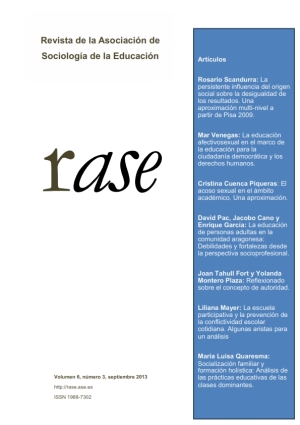La educación de personas adultas en la comunidad aragonesa: debilidades y fortalezas desde la perspectiva socioprofesional
DOI:
https://doi.org/10.7203/RASE.6.3.8671Keywords:
Lifelong learning, Aragón, Adult education, Spain, Quality assessment, Qualitative methodology. Abstract
Abstract
This article describes an evaluation process for the Continuing Education Public Centres of Aragon (CPEPA). It presents the results of a study carried on for more than three years, where we gathered quantitative information that gave us an overview, as well as qualitative information gained through interviews and focus groups, that gave us a snapshot of daily reality as perceived by actual system participants: administrators, faculty and students. Auditing techniques suitable for quality certification were combined with field work and the collection of ethnographic qualitative data. Specifically, we collected information on the 33 CPEPA facilities in the Comunidad Autónoma. Once the essential aspects of the daily routine of the CPEPA facilities were identified, we focused on obtaining information from three key sources: administrative staff, faculty, and regional social factors. Finally, we formed 6 focus groups with the various participants involved in each region. The results primarily centered upon providing guidance on the adequacy of course offerings, upon the role of faculty, and upon the state of infrastructure, in addition to institutional interactions among the various agents involved in adult education. An essential aspect is to preserve and guarantee the autonomy of the Centres in order to provide course offerings suitable to recipients in various regions. To make this happen it is necessary to improve inter-institutional coordination, to promote the exchange of ideas and resources by implementing various educational programs through information and communication technologies, to improve the relationship between the educational world and the business world, and to develop policies that permit continuing education to take into account different territorial and demographic realities.
 Downloads
Downloads
Downloads
Published
How to Cite
-
Abstract336
-
PDF (Español)132
Issue
Section
License
![]()
This work is licensed under a Creative Commons Reconocimiento-NoComercial-CompartirIgual 4.0 Internacional.




